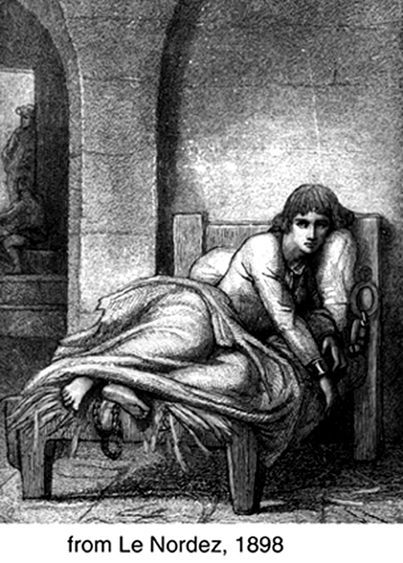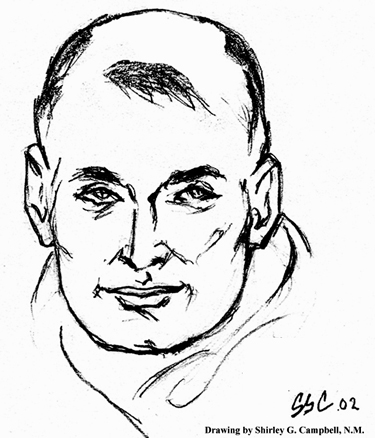
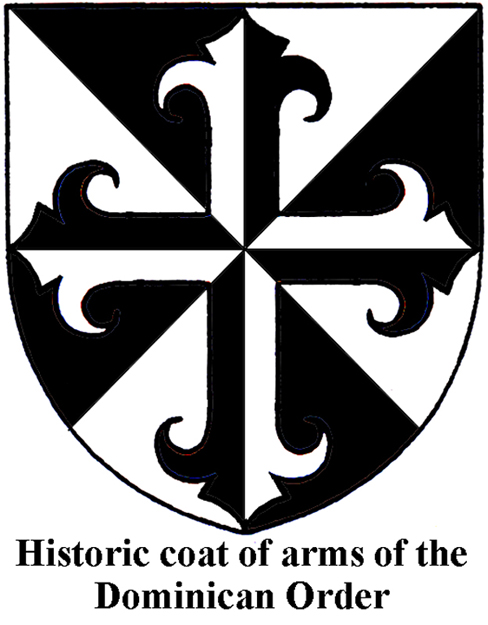


Brother Isambart de La Pierre, Part III
CHAPTER 36
CRUSHED BY THE WHEELS OF INJUSTICE
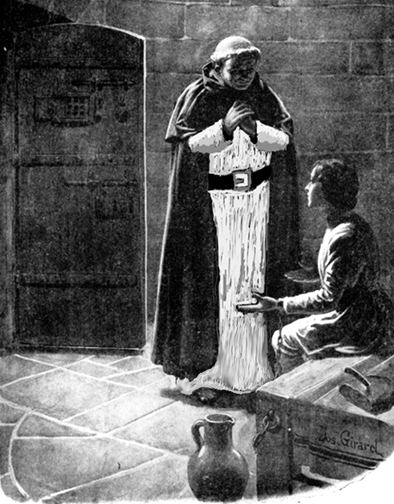
Days slipped into weeks and weeks into months, and still the same routine: from the cell to the courtroom, from the courtroom to the cell. Imprisonment began to take its toll on Jeanne. It was a long time before I could again speak privately with her. During all that time, I witnessed firsthand her incredible sufferings at the hands of her jailers. She took it with such profound patience and peace of soul that I was prompted to question her.
Jeanne sat on the filthy mattress, weighted down by her usual restraints. She was pale and thin from months of captivity. Her clothing were turning into rags, and she reeked of odor. I sat on a small stool beside her.
"Jeanne, how are you able to face these trials with such patience?
She smiled wearily. "My confessor, Father Pasquerel, once told me what Saint Paul said: 'Rejoice in the Lord always, and be content with poverty or plenty.' I had my plenty, and now I have my poverty. Blessed be the Lord! I must live for what Jesus wants, what He desires in this present moment. I am not to worry about tomorrow or yesterday or even what will happen to me a minute from now.
"Before I jumped from the tower, I commended myself to God's protection and closed my eyes. As I fell, the air rushed past my face. My fall seemed to last a very long time. I landed on my feet but immediately I crumbled into a heap. Pain rushed through me like a fire. I lay in this incredible pain, worse than any of my battle wounds. I cried out, 'Jesus help me! Help me, please! I can't endure this terrible pain!'
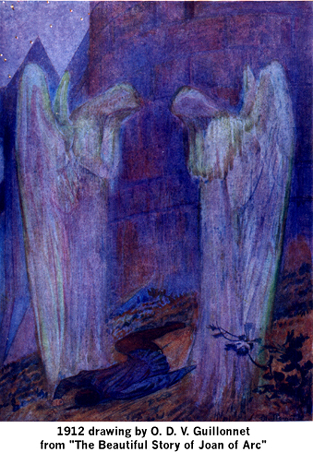
"Then I saw my Saints, Catherine and Marguerite, standing before me. They reprimanded me for what I had done. Jeanne, you say you wanted God's help, but how can He help you when you put yourself in danger? You jumped from a sixty-foot tower! How can you expect not to be hurt?' I cried out, 'Oh blessed and faithful friends! I did surrender myself to God! I did!'
No, Jeanne, you did not surrender yourself. You have gone against our direct instructions not to jump. How can God help you if you will not follow His Will for you?
"I remember raising my arms as I went to my knees. 'Please forgive my, disobedience. I am truly sorry, but I don't know how to surrender myself to God any more than I have already done! Please, blessed saints, teach me how.'
"Tenderly, they embraced me. Daughter of God! The Lord has forgiven you, but you must go to confession right away and do as penance whatever the priest tells you. As a further penance, you are to bear patiently the next few days of pain you will experience. Will you do this?
'Yes, my beloved friends. I will bravely endure all for the love of Jesus.' They smiled down at me as they placed their hands under my chin, raising up my face. Then they instructed me on how to surrender myself totally to God."
"How does one surrender totally to God?"
"My Voices taught me a very short and simple prayer. " She smiled. "Yes, Brother, I will tell you. The prayer is this: Jesus, I trust in You. "
Surprised, I repeated the phrase. "Jesus, I trust in You? That is all?
Had I any doubt of her innocence, it was ripped from me! I understood that this child was being crushed in the winepress of English oppression and political expediency. God, forgive me for my cowardice. I should have defended her but to my dying shame, I did not.
The next time I saw her, Father Massieu and I went to fetch Jeanne for the day's session. When the door to her cell opened, the putrefied stench of urine came wafting out. The place reeked so; I had to force myself to enter. As our eyes slowly became accustomed to the half-light in that appalling chamber, we saw Jeanne was sitting up in her bed hugging herself and shivering, drenched to the skin. Her chains rattled as she shook, and her teeth chattered uncontrollably from the cold.
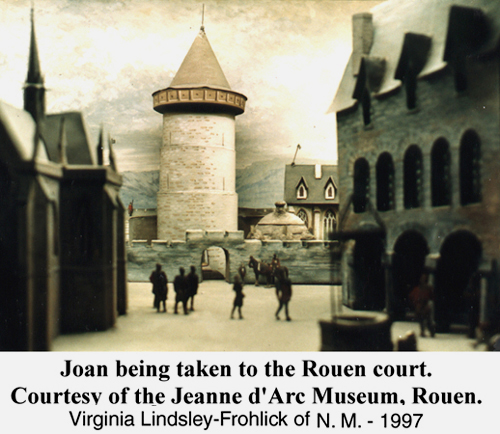
I noticed a large over-turned bucket. A trail of puddles led from the bucket to Jeanne. Enraged, I confronted her guards, "What have you done?"
They sank into fits of laughter, slapping each other on the back. One answered between howls of delight. "The witch was starting to smell, so we gave her a bath!"
I don't know what prevented me from striking them! Jeanne shook so violently that she was unable to walk without our help. We took longer than usual to reach the courtroom, as we tried to warm her by stopping in the sunlight. Unfortunately, we did not have a change of clothing, so there was little we could do. She suffered all day until her own body heat dried her clothes.
The day's session started in the same old way. "We summon you, Jeanne, to swear and take oath, to answer the truth on whatever concerned this trial."
Jeanne was weary of their relentless games. Despite her shivering, she answered. "Willingly will I swear to tell the truth on whatever touches this trial, but not all that I know."
Again the Bishop pressed her to swear in totality. She shook her head without looking up at him. "You should be satisfied, because I have sworn enough."
The Bishop signaled Father Beaupère to take over the questioning. With a false sense of concern he asked her how she fared since last Saturday.
"You can see for yourself. I am as well as can be."
The sessions were long and exhausting, often lasting three or more hours. It became clear that the purpose of the questions was not to get at the truth, but to confuse and browbeat Jeanne into submission. Thus she was purposely questioned in a haphazard way with her interrogators leaping from one subject to another in a bewildering manner. They would ask intricate questions, which they repeated continually in hopes of tricking her, so she would contradict her previous statements. Many times their questions were unintelligible, with one judge interrupting another. They would shout at her from all sides, two or three at a time. Before she could answer one, another would yell out his question. I heard her say many times, "Good Lords, speak not all at once, for I cannot understand you." But her heartfelt pleas were ignored. Beaupère continued his own line of questions, with the other judges shouting and interrupting the entire time.
JUDGE: "Do you fast every day this Lent?"
JEANNE: "Is that any of your business?"
JUDGE: "It most certainly is."
JEANNE: "Yes, I have fasted each day of Lent."
JUDGE: "Did you hear your Voice on Saturday in this court room?"
JEANNE: "That is not part of your trial. But, yes, I did hear it."
JUDGE: "What did it say to you last Saturday?"
JEANNE: "I did not entirely understand it, and I understood nothing I could repeat to you, until I went back to my cell."
JUDGE: "What did your Voices say to you in your cell?"
JEANNE: "It said, to answer you boldly. I asked advice from my Voice about what questions you would put to me. I will gladly tell you what Our Lord sanctions me to reveal, but as for my revelations regarding the King of France, I will not tell you without permission from my Voices."
JUDGE: "How can you distinguish between those points you will answer from those you will not?
JEANNE: "On some things I have asked approval and have received it. I would rather have been drawn and quartered than come to France without God's permission!"
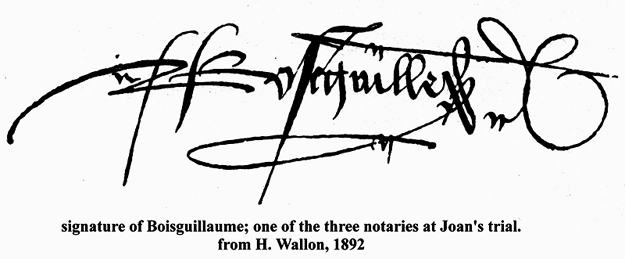
JUDGE: "Was it God Who ordered you to wear men's clothing?" (Basing their opinion upon the Old Testament book of Deuteronomy, Chapter 22, the court believed it was a grave sin for Jeanne to wear male attire. By claiming God's permission, she was attributing this sin to God.)
JEANNE: "My dress is a small matter, nay, the least thing. I did not take it on the advice of any man. I did not take or put on this dress or have I done anything except by the command of God and His angels."
JUDGE: "In this particular case you did well in taking the dress of a man?"
JEANNE: "I have done nothing in this world but by God's command."
JUDGE: "Was there an angel over the head of your King when you saw him for the first time?"
JEANNE: "By Our Lady! If there were I know not, and I did not see it."
JUDGE: "Did you have your sword when you were captured?" They considered the sword of Saint Catherine to be a magical object.)
JEANNE: "No. I had taken one from a Burgundian. It was a good weapon for fighting, excellent for giving hard clouts and good buffets."
JUDGE: "Which do you care for more, your standard or your sword?"
JEANNE: "Forty times better, my banner than my sword!"
Beaupère ended his questioning, and the Bishop then ordered Master Jean de La Fontaine to continue the interrogation. Normally, the position of Master of Canon Law was assigned to an older man, but La Fontaine had risen to the heights of Master in a very short time. He was a genius of canon law, and had proven himself capable in past trials. This self-assured man had obtained his high position by the age of twenty-seven. He had a handsome face with a strong, tapering chin and a high forehead. Thin eyebrows arched finely over his large hazel eyes. His black cap cut across the middle of his forehead and sharply angled down to cover most of his ears. He was neither kind nor cruel but did his job efficiently and without emotion. Master Jean remained seated with his hands folded as he questioned her.
JUDGE: "Jeanne I require you to take the oath that you will speak the simple and absolute truth on what you will be asked."
JEANNE: "Of what concerns this trial I will willingly tell you the truth. I will tell you as much as I would tell if I were before the Pope of Rome."
JUDGE: "Which Pope do you believe to be the true Pope?" (At the time there was an Antipope in Spain and the true Pope in Rome.)
JEANNE: "Are there two of them?"
JUDGE: "Do you always see Saints Catherine and Margaret in the same dress?"
JEANNE: "I always see them in the identical appearance, and they are richly crowned. Of their other clothing I will not speak. I know nothing of their garments."
JUDGE: "How do you know whether the objects that appear to you are male of female?"
JEANNE: "I know well enough. I can tell them apart by their voices, as they have told me. I do not know anything that is not by divine inspiration and God's command."
JUDGE: "What part do you see?"
JEANNE: "Their face."
JUDGE: "Do your Saints have hair?"
JEANNE: "It is good to know that they have." (Jeanne could be very sarcastic.)
JUDGE: "Is there anything between their crowns and their hair?" (The judge was curious to know whether her Voices had halos.)
JEANNE: "No."
JUDGE: "Is their hair long and dangling?"
JEANNE: "I do not know. I do not know if they have arms or other members. They speak very well and in beautiful language that I understand perfectly."
JUDGE: "How do they speak if they do not have mouths?"
JEANNE: "I leave that to God. The Voice is gentle, soft and low and speaks the French language."
JUDGE: "Does Saint Margaret speak English?"
JEANNE: "Why should she speak English, when she is not on the English side?"
JUDGE: "Did you have any rings?" (The judge believed she had worked magic with them.)
Jeanne turned to the Bishop. "You have one; give it back to me. I pray you, if you have my ring, let me see it. The Burgundians have the other ring."
JUDGE: "Who gave you the ring that the Burgundians now have?"
JEANNE: "It was a gift from my papa and momma. It seems to me it had on it the names Jhesus, Maria. I do not know who put them there. It had no stone, as far as I can remember and it was given to me at Domremy."
JUDGE: "Did you ever work any cures by touching a person with your rings?" (Had she healed anyone by means of witchcraft?)
JEANNE: "I have never cured anyone with my rings."
JUDGE: "Did your Voices say you would be delivered from prison within three months?"
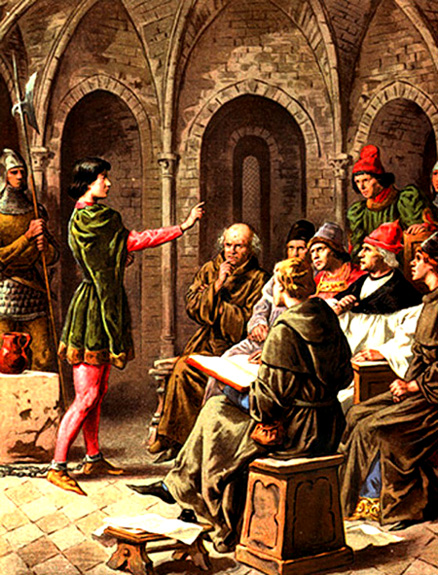
"You have no right to know that! However, I do not know when I shall be delivered." She smiled and looked toward the Bishop. "Those who wish me out of this world may well precede me."
JUDGE: "Did your counsel not tell you that you would be delivered from your present prison?"
JEANNE: "Ask me again in three months, then I will answer."
JUDGE: "Did your Voices prohibit your speaking the truth?" (Her Voices could not be from God if they forbade her to tell the truth.)
JEANNE: "Do you want me to tell you what concerns of the King of France? There are many topics that are no concern of this trial. I know very well that my King will rule the Kingdom of France as certainly as I know that you are seated before me in judgment. I should die if my revelations did not daily comfort me."
JUDGE: "In what appearance does Saint Michael come to you?"
JEANNE: "I did not see his crown. I know nothing of his garments."
JUDGE: "Was he naked?"
Jeanne reared back on her stool from shock and revulsion. "Do you think that God does not have the means to clothe him?"
JUDGE: "Did he have hair?"
JEANNE: "Why should he cut it off?"
JUDGE: "When you confess, did you ever feel you were in mortal sin (A good spirit would never come to person who was in mortal sin. Therefore, her Voices could not be good spirits.)
Dismayed Jeanne cried out, "Please God, I never was in such sin! If it pleases Him, I shall never commit such a deed as to burden my soul so greatly!"
JUDGE: "Did your King have a crown at Reims?"
JEANNE: "The King joyfully took the crown he found at Reims; though later a much richer one was brought. He hurried matters, at the request of the people of Reims, to avoid the burden of keeping the army. Yet, if he had waited he would have had a crown a thousand times richer."
JUDGE: "Do you know by revelation that you will escape?"
JEANNE: "That is none of your business! Do you desire me to speak against myself?"
JUDGE: "But they did speak of it in a general way?"
JEANNE: "Yes, indeed, they told me, that I shall be delivered, but I do not know the day or the hour, and that I must boldly show a cheerful countenance before you."
JUDGE: "Do you believe that you would commit a mortal sin by taking a woman's dress?" (Here they were establishing that Jeanne was attributing evil actions to The Good God.)
JEANNE: "It is better to obey and serve my sovereign Lord, namely God!"
JUDGE: "Did you not say that pennants made like yours would be lucky?" (Again this touched on witchcraft.)
She proudly straightened her posture and moved her right arm forward as if she were leading a charge, "What I said was: 'Go boldly among the English,' and I went among them, too!"
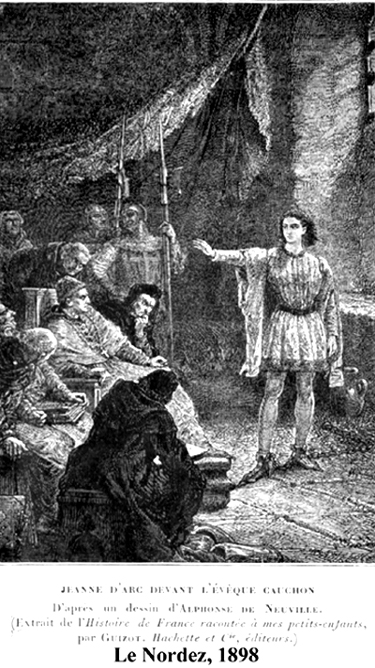
JUDGE: "Did the people of your own party firmly believe you were sent by God?"
JEANNE: "I know not if they believe it. I leave that to their opinion. But even if they do not, nevertheless, I am sent from God."
JUDGE: "In what spirit did the people of your party kiss your hands, feet and garments?" (If she encouraged people to worship her, that would be idolatry.)
JEANNE: "Many came to see me gladly! They kissed my hands as little as I could help! The poor folk gladly came to me, for I did them no unkindness, but helped them as much as I could."
JUDGE: "When you made your sortie from Compiegne were the bells rung?"
JEANNE: "If they were rung, it was not by my order or knowledge. I did not think so, and do not remember having said that they should be rung."
JUDGE: "Is the sign that you gave the King made of gold, silver, or precious stones, or a crown?" Here La Fontaine started to pry into information that Jeanne believed only concerned her King.
"I will not tell you! No man can describe a thing as rich as that sign." Swiftly Jeanne turned her attention to the promoter and pointed at him. "But the sign you need is for God to deliver me from your hands! That would be the most certain sign He could show you!"
La Fontaine changed his tactic. "Hasn't your angel failed you in allowing you to be taken prisoner?" (He was trying to show that her Voices had betrayed her by allowing her to be captured.)
"Since it pleased God, I believe it was for my well-being that I was taken."
He began to stroll casually toward Jeanne as he spoke in soft tones. "Has your angel failed you in the good things of grace?"
Surprised by his question, Jeanne looked up at him. "How should he fail me, when he comforts me every day?"
Like a tiger stalking its prey, he slowly closed in on her. "Have you ever called them without their coming?"
Jeanne emphatically replied, "I have never needed them without having them."
Suddenly, he pointed his finger at her and yelled, "Do you think you did wrong in taking male attire?"
"No! Even at this moment if I were back with my own party, it seems to me that it would be for the greater good of France for me to continue as I did before my capture."
JUDGE: "What was the sign that you gave your King?"
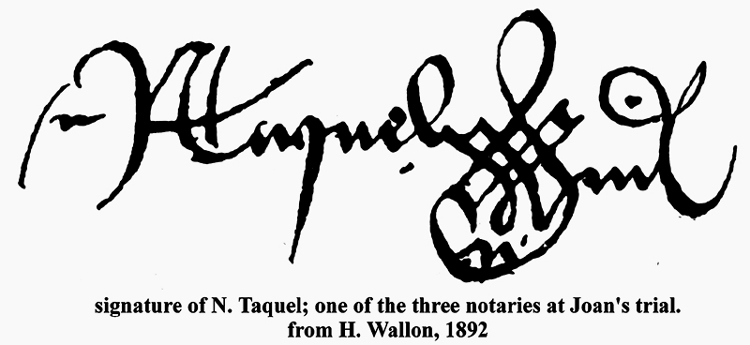
JEANNE: "Would you be satisfied if I perjured myself?"
JUDGE: "Have you promised and sworn not to reveal the sign?"
"On my own I have sworn and promised not to reveal the sign, because I was asked too many times to reveal it." Jeanne began to talk to herself. "I promise that I will not speak of it to any one in the world." Silent for a moment, she apparently forgot what she had just said, "The sign was an angel who brought my King a crown, telling him that by God's help and my efforts he would possess the whole Kingdom of France."
Poor Jeanne, I thought. Are you losing your mind?
JUDGE: "How did the angel carry the crown? Did the angel place it upon your King's head?"
JEANNE: "It was given to the Archbishop of Reims as I remember, in the presence of the King. The Archbishop took it and gave it to the King. I was present when this happened. This crown is now in the King's treasury."
JUDGE: "Where did this happen?"
JEANNE: "In the King's chamber at the castle of Chinon."
JUDGE: "What was the crown made of?"
JEANNE: "It is well to know that it was of pure gold. It is so rich and precious that I do not know how to tell its beauty. It signified that my King would gain the Kingdom of France."
JUDGE: "Did all those with the King see the angel?"
JEANNE: "I believe the Archbishop of Reims, the lords D'Alençon and la Tremoille and Charles de Bourbon saw it."
Like any good inquisitor, he tried to confuse Jeanne and abruptly changed his line of questioning. "Why did you jump from the tower at Beaurevoir?"
"I had heard that the people of Compiegne, all - down to the age of seven, were to be put to death by fire and the sword. I would rather die than live after such destruction of good people. That was one reason. The other was that I knew I was sold to the English. I would rather have died than fall into the hands of my enemies, the English."
JUDGE: "Did your Voices counsel you to jump?"
JEANNE: "Saint Catherine told me almost everyday not to jump, that God would help both me and the people of Compiegne. I told Saint Catherine that since God was going to help the people of Compiegne, I wished to be there too."
JUDGE: "Did you leap expecting to kill yourself?"
Jeanne flushed. "No! For in the act of leaping I commended myself to God. I hoped by the leap to escape and avoid being delivered over to the English." Though weighted down by her heavy shackles, she stood up with renewed vigor and defiantly advanced toward the Bishop. "You say that you are my judge. I do not know if you are! But take good care not to judge me wrongly, because you will put yourself in great danger. I warn you, so that if God punishes you for it, I would have done my duty by telling you!"
What uproar followed! The judges were beside themselves with indignation. Bishop Cauchon coolly stared at her for quite a while.
"What exactly is the danger?"
Jeanne gazed unflinchingly into his cold, empty eyes.
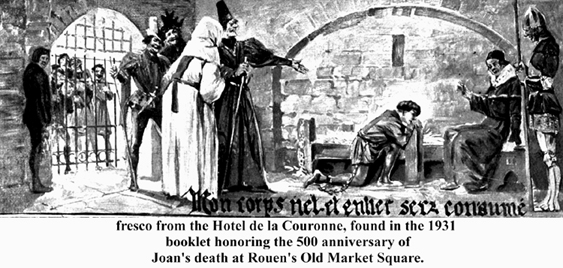
"Saint Catherine told me that I would have help. I do not know if this will be my deliverance from prison. Or if, while I am tried, some disturbance will happen through which I would be delivered. I think help will come to me one or the other. My Voices say,
You shall be delivered by a great victory! Take everything peacefully; have no care for your martyrdom because you will come to the Kingdom of Paradise. This, my Voices say to me simply, clearly and without fail." She began to weep and shifted her weight from one foot to the other. The chains clanked against the stone floor. "I believe my martyrdom is the sorrow and adversity I suffer in prison. I know not if I will have to bear greater sufferings, but therein I commit myself to God!"
JUDGE: "Since your imprisonment have you ever denied or cursed God?"
"I have not! Sometimes I have said: 'By God's good will!' or 'Saint John!' or 'Our Lady!' Those who reported my words to you have badly understood."
By connecting the wearing of male attire with submission to Church authority, Cauchon and his cronies came up with a ploy that would seal her fate. La Fontaine began the process by craftily placing this noose around her neck. Ever so slowly, over the coming weeks, this supposed connection would be strengthened, until they dragged her to the flames with it.
JUDGE: "Once again do you consent to wear female attire to go and hear Mass?"
JEANNE: "I will have counsel on it, and then I will answer you. But I urge you, my lord Bishop, for the honor of God and Our Lady permit me to hear Mass in this good town."
JUDGE: "Why do you so stubbornly refuse to wear a woman's dress?"
JEANNE: "Because I don't want to be raped by those animals you have constantly guarding me!"
Cauchon angrily ordered that exchange stricken from the record. Jeanne always maintained that the wearing of her male clothing was a symbol of her God-given mission. She would wear it until her mission was over and declared it would not be completed until the last English soldier was gone from the soil of France. Then she would eagerly return to woman's dress.
JUDGE: "First you must simply and absolutely promise to take a woman's dress!"
JEANNE: "Give me a dress that is modest and I will wear it to go to Mass. Please, my lord Bishop, I beg and urgently implore you, to permit me to hear Mass in the attire that I am wearing, without forcing me to change."
JUDGE: "On what you have said and done, will you submit and commit yourself to the decision of the Court?"
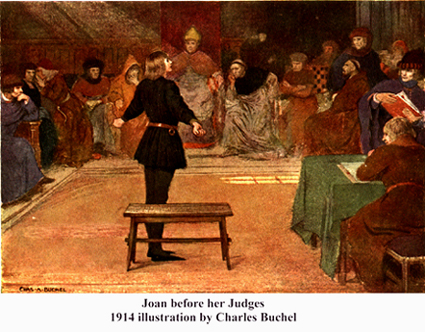
JEANNE: "My words and deeds are all in God's hands. I commit myself to Him! I assure you I would do or say nothing against the Christian faith. If I had said or done anything, or if anything was found in me that is against the Christian faith established by Our Lord, I would not support it but would cast it out!"
JUDGE: "Will you refer yourself to the judgment of the Church?" What they really meant was "will you submit to us?"
JEANNE: "I refer them to Our Lord, Who sent me, to Our Lady, and to all the blessed Saints of Paradise! Our Lord and the Church are all one. Why do you make difficulties about it?"
"There is the Church Triumphant," La Fontaine explained, "where God, the Saints and the saved souls are. The Church Militant is the church on earth. That consists of the Pope, the Prelates, the clergy and all good Christians. This Church in proper assembly cannot err and is governed by the Holy Spirit. Therefore, we ask you to submit to the Church Militant, namely the Church on earth." (The phrase "Church on earth" meant this court.)
JEANNE: "I came to the King of France from God, and at the command of the Church Victorious above! To this Church I submit all my good deeds and all I have done and should do. As to whether I will submit to the Church Militant, I will answer nothing more!" Jeanne knew this Bishop was her enemy and she did not want to submit to him
JUDGE: "If we give you a woman's dress that you might hear Mass, would you take it?"
Jeanne knew that once she took off her male attire and put on a dress to attend Mass, they would not allow her to return to her male clothes. "I will not put a woman's dress on until it should please Our Lord. If I am sentenced to die at the stake, I request the Lords of the Church to grant me the mercy of a woman's dress and a hood for my head. I would rather die than turn back from what God has ordered me to do. I firmly believe God would not let me be brought so low, without presently being given His help or miracle."
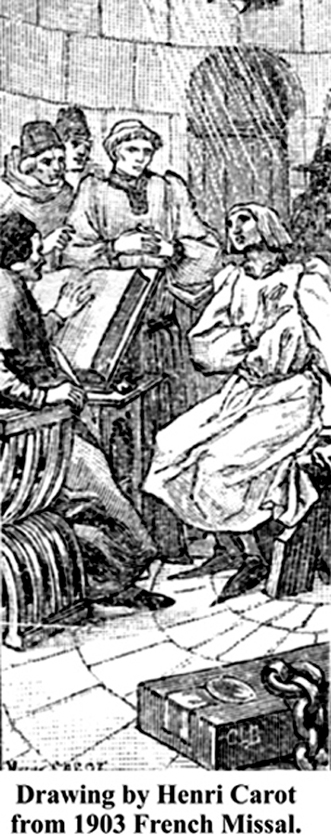
JUDGE: "Will you submit yourself to our Holy Father, the Pope?"
"Yes." She then became more cautious. "Provided I am led and taken to him. I will not submit to those here present, that is to say the Bishop of Beauvais and this court, for you are my mortal enemies!"
JUDGE: "Are you not bound to answer the whole truth to the Pope, concerning all that is asked of you on matters of faith and the state of your conscience?"
"Very well, I demand to be brought before him!" Jeanne added emphatically, "I will answer him all that is required!"
In the passion of the moment I forgot my own safety and leaned over to counsel her. "Jeanne, submit yourself to the Synod of Bishops which is now in session in Switzerland. At this council there will be many French prelates and doctors."
With this news, her face lit up. "Oh, if in that place there are some of my countrymen, I am very willingly go and submit myself to that Synod."
Bishop Cauchon was furious! His face turned crimson while his neck veins bulged. He jumped to his feet and thundered, "Hold your tongue! In the Devil's name!" Pointing his finger at the notary, the enraged Bishop sternly commanded, "Do not write that!"
This caused Jeanne to cry out pitifully. "Ha! You take great care to put down in your trial everything that is against me, but you will not write down anything that is for me!"
Once again La Fontaine changed the course of his questioning. "During the coronation at Reims cathedral why was your standard carried into the church rather than those of the other captains?"
JEANNE: "It had shared the burden; it was only right that it should share the honor."
One of the judges jumped to his feet and shouted, "Why do you refuse to do woman's work?"
Jeanne fired back, "There are plenty of other women to do it."
One of the other assistant judges, a portly old man, cut in, "What exact words do you use to summon your Voices?"
With joined hands Jeanne went to her knees and bowing her head she began to pray, "Most sweet Lord, in honor of Your Holy Passion, I implore You, if You love me, that You will reveal to me how I am to answer these churchmen. As to my clothing, I know full well the command by which I put them on; but I do not know how I am to leave them off. For this, may it please You to teach me."
In disgust, Cauchon ended the session.
As Father Massieu and I escorted Jeanne across the courtyard, she saw a small boy playing ball. Surprised that a child would be in such a terrible place as this, she asked, "Is that boy a prisoner too?"
Father Massieu smiled. "That young boy is no less than Henry the Sixth, King of England!"
A strange look came across Jeanne's face. She stared at him with an attitude of joy. With many a backward glance she watched him for as long as she could. This piqued my curiosity.
"Why do you have such a strange reaction at seeing him?"
"At Beaurevoir my Voices once told me I would not be delivered until I had seen the King of England." With tears in her eyes, she lifted her hands prayerfully. "Father! Do you know what this means? The time for my deliverance is soon, and I will be free of the hideous place!"
"I hope you are correct and that this trial will have a happy end," I said.
Looking back, I see that her Voices did speak true. She was soon to be delivered by a great victory, but not in the way that Jeanne had hoped.
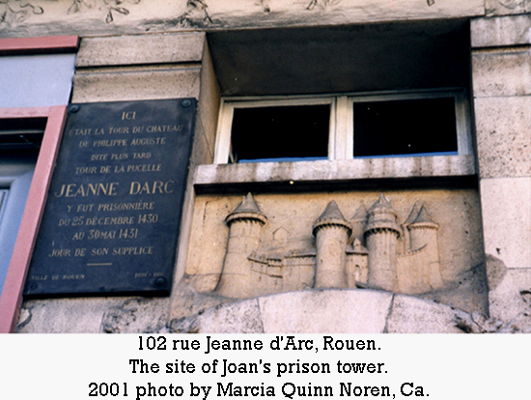
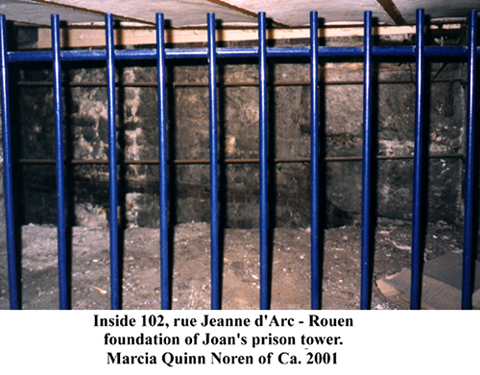
His Excellency the Bishop of Beauvais saw clearly how Jeanne's demeanor and wisdom had won over many of the court. This vexed him greatly. The problem he had was how to keep the façade of a fair trial alive while dismissing those who had become tainted by her wiles. He solved his dilemma by cunningly moving the court sessions to Jeanne's cell. This gave him the legal right to reduce the assistant judges down to the most loyal, hand-picked few. Cauchon, Master La Fontaine and eight other assistant judges came to Jeanne's cell for the reading of the trial's records. To give the proceedings an air of legitimacy, Cauchon granted Jeanne's request that the questions and answers be read back to her in sequence. Chief Clerk Manchon read the record. Most of it went unchallenged, but occasionally she did make corrections. She was aware that some of her statements were missing but did not bother to mention them because she knew they would not be restored. She added that her surname was d'Arc or Romée, saying that in her country a girl bore the surname of her mother. On the matter of her taking the dress of a woman she said, "Give me a woman's dress in which to go to my mother's house. I will take it to escape prison but once outside I would take counsel as to what I should do next."
The judges said nothing but only shook their heads. Jeanne spoke up once more. "My lord Bishop, seeing that tomorrow is Palm Sunday I request to be allowed to attend Mass and receive Communion."
He and his assistants left in stony silence.
The next day, Palm Sunday, Bishop Cauchon with seven of his aides came to her prison to begin that day's questioning. The rats protested our entry as they scurried to their hiding places. We found her guards engrossed in their favorite pastime of slapping Jeanne across her face.
Cauchon made no comment about this treatment, instead he spoke with all the guile of the garden's serpent.
"Jeanne, the other day you asked permission of us to attend and hear Mass. To do this would you be willing to take and put on the dress of your country?"
"I request of you, my Lord Bishop, that I be permitted to attend and hear Mass in my present male attire. I also request that I be permitted to receive Communion on Easter Sunday."
Again the Bishop repeated his question, "Will you put on the dress that the women wear in your country to attend Mass?"
Fervently she declared. "You could very well allow me to hear Mass in this attire! I hunger for it above anything. But I cannot change my clothing because it does not rest with me. I don't yet have God's permission to do so."
Father Beaupere several times exhorted her to reconsider her answer, because he was aware of how sincerely she desired to have the Bishop's permission to go to Mass.
Slowly, Jeanne shook her head. "I solemnly beg of you, my Lords, allow me to attend Mass and receive Holy Communion in my male attire. This dress does not burden my soul and my wearing it, is not against the Church."
The judges left her cell in disgust, denying her heartfelt request to receive the sacraments. This request meant more to her than life itself because to Jeanne Communion was the source of her strength, her soul's nourishment, her spirit's refreshment, her life's only joy! To be denied Our Lord was the worst punishment, the greatest anguish and the deepest wound that they could ever inflict!
